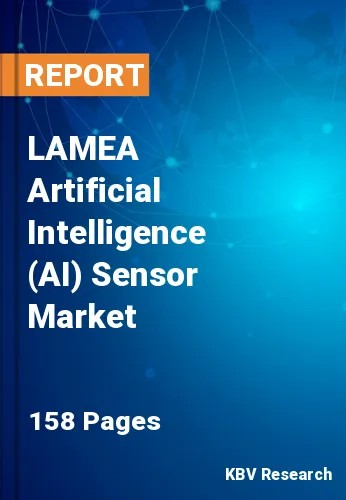The Latin America, Middle East and Africa Artificial Intelligence (AI) Sensor Market would witness market growth of 44.6% CAGR during the forecast period (2023-2030).
A lot of companies use AI technology to provide better customer service. Chatbots are increasingly important for businesses as the demand for more effective communication platforms increases due to the development of natural language processing using artificial intelligence (AI). It can provide quick, precise responses to customers with more basic inquiries.
Customer support representatives can focus more on complex queries requiring more human touch by using chatbots, which can use previous questions and historical data to offer customized results. For instance, the Swedish clothing retailer H&M utilizes a chatbot to help mobile shoppers find outfit possibilities. A Facebook chatbot was developed by the American restaurant operator Dominos to speed up orders. Such aspects are likely to support the expansion of the AI sensor market in the near future.
The factors predicted to drive the expansion include the growing demand for life-saving medical equipment and the availability of self-driving features in new electric vehicles. The shift in emphasis toward digitization is projected to accelerate the expansion of AI sensors. Increasing efforts by tech firms to increase user access to artificial intelligence (AI) will boost market expansion throughout the projected period.
Spending on artificial intelligence (AI) in the public sector of the UAE's economy surged by 65.1% in 2018 to reach USD 52.1 million and is predicted to grow at a CAGR of 25.2% from 2019 to 2025, from USD 76.6 million to USD 368.3 million. By 2030, AI is anticipated to contribute almost 14% (or USD 96 billion) of the country's GDP. The UAE has already started integrating AI into the education, healthcare, space, transportation, and aviation sectors. These elements are predicted to support the regional market.
The Brazil market dominated the LAMEA Artificial Intelligence (AI) Sensor Market by Country in 2022 and would continue to be a dominant market till 2030; thereby, achieving a market value of $795.8 million by 2030. The Argentina market is showcasing a CAGR of 45.4% during (2023 - 2030). Additionally, The UAE market would register a CAGR of 44.2% during (2023 - 2030).
Based on Type, the market is segmented into Optical, Motion, Position, Pressure, Navigation, Temperature, Ultrasonic, and Others. Based on Technology, the market is segmented into Machine Learning, Natural Language Processing, Computer Vision, and Context-aware Computing. Based on Application, the market is segmented into Smart Home Automation, Healthcare, Automotive, Manufacturing, Robotics, Aerospace & Defense, Consumer Electronic, and Others. Based on countries, the market is segmented into Brazil, Argentina, UAE, Saudi Arabia, South Africa, Nigeria, and Rest of LAMEA.
Free Valuable Insights: The Worldwide Artificial Intelligence (AI) Sensor Market is Projected to reach USD 39.3 Billion by 2030, at a CAGR of 38.8%
The market research report covers the analysis of key stake holders of the market. Key companies profiled in the report include Robert Bosch GmbH, Sensata Technologies Holdings PLC, Sony Corporation, Baidu, Inc., BAE Systems PLC, Oracle Corporation, RELX PLC (LexisNexis Risk Solutions, Inc.), Sensirion AG, ACI Worldwide, Inc. and SAS Institute, Inc.
By Type
By Technology
By Application
By Country
Our team of dedicated experts can provide you with attractive expansion opportunities for your business.

